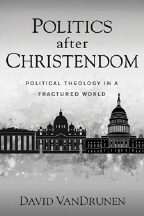Politics After Christendom: Political Theology In A Fractured World -- By: Caleb Newsom
Journal: Eikon
Volume: EIKON 03:1 (Spring 2021)
Article: Politics After Christendom: Political Theology In A Fractured World
Author: Caleb Newsom
Eikon 3.1 (Spring 2021) p. 144
Politics After Christendom: Political Theology In A Fractured World
Caleb Newsom is a M.Div. student in Ethics & Philosophy at the Southern Baptist Theological Seminary and a member at the First Baptist Church of Fisherville.
REVIEWED BY

David VanDrunen. Politics after Christendom: Political Theology in a Fractured World. Grand Rapids, MI: Zondervan Academic, 2020.
Politics After Christendom: Political Theology in a Fractured World by David VanDrunen is a work of political theology that advances a robust understanding of human institutions through the framework of the Noahic Covenant. In the past and now into the present, evangelicals have lacked a robust political theology that positively articulates Scripture’s conception of government and other human institutions. While VanDrunen does acknowledge the streams in Christian political thought he is attempting to correct, his book is largely a self-attesting work of political theology that relies on careful exegesis and systematic and biblical theology and that locates itself in continuity with the Reformed and Thomistic traditions of Christians seeking to understand the perennial issue of statecraft.
Eikon 3.1 (Spring 2021) p. 145
Summary
In the first part of the book, which is dedicated to the theological underpinnings of political theology, VanDrunen begins by laying out a foundational conception of government as having been instituted by God “to be legitimate, but provisional, and to be common, but accountable” (25). In the first couplet of his definition, VanDrunen asserts that government possesses valid human authority over its proper jurisdiction, but this authority is only temporary, as it will no longer exist at the second coming of the Lord Jesus Christ (29). The second couplet summarizes the biblical teaching that God instituted government to be an institution for the inclusion of all peoples regardless of skin color or creed while also maintaining that government is morally accountable to God for its actions (35). Thus, government must not discriminate against the people it is obligated to govern. It must instead govern according to the objective moral order.
In chapter two, entitled “Nature, Grace, and Biblical Covenants,” VanDrunen offers a brief survey of the biblical covenants with their terms and promises. The Noahic Covenant is differentiated from the other covenants in that it has “different parties, different promises, and a different destiny” (72). The Noahic Covenant does not mark off a holy people nor entail promises of salvation. Rather, the Noahic Covenant is the covenant that God made ...
Click here to subscribe
